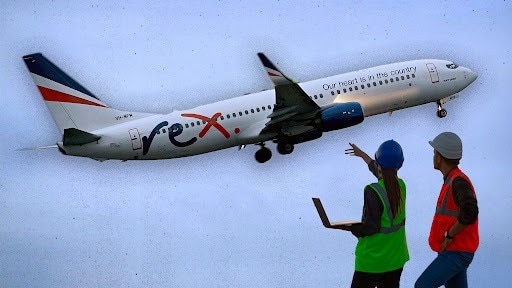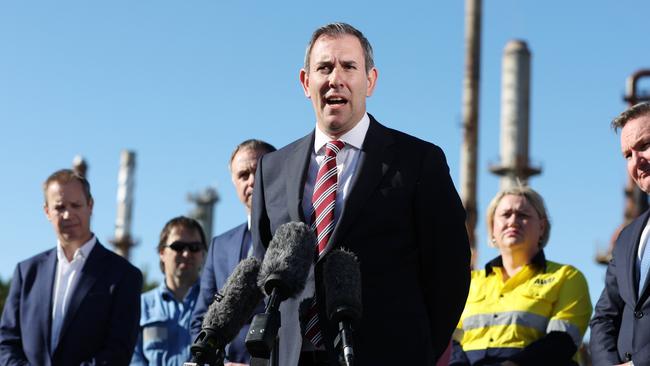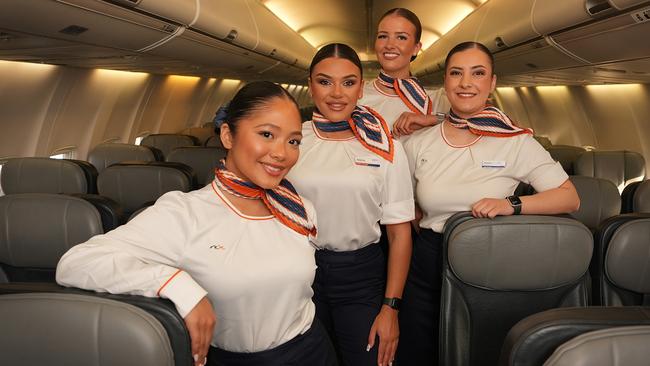Where Rex went wrong and who will pay the highest price
Rex has been placed into administration but regional services will continue to operate for now.

Business
Don't miss out on the headlines from Business. Followed categories will be added to My News.
An ambitious expansion into major city routes has taken Rex to the point of collapse with the airline being placed into administration and 737 operations suspended immediately.
As Rex management stayed silent on the airline’s predicament and the company remained in a trading halt, online bookings for flights operated by nine 737s were suddenly unavailable.
Employees were kept in the dark on the situation being told only it was not appropriate to make comment and that “recent media speculation was a threat to safety”.
A high level source at Rex said they were awaiting a report from financial consultancy EY to determine their fate, with administration the most likely outcome.
The suspension of flight bookings on 737 services appeared the first step towards winding up jet operations altogether.
Crews arriving in Brisbane on Tuesday were also surprised to find their hotel rooms were unavailable due to “unpaid bills” and Rex’s Uber account was no longer accessible.
Late Tuesday a statement was posted to Rex’s website, informing shareholders and customers EY had been appointed as voluntary administrations, and 737 operations would be cancelled.
The trigger for Rex’s sudden demise was thought to be Asian private equity firm PAG which invested $150m into the airline in convertible notes, to help establish a jet operation.
All but $30m of the funds had been drawn down by Rex, as the 737 services continued to lose money at a rate of almost $1m a week.
Under the deal, PAG was entitled to earn 4 per cent a year interest on its investment, and convert into equity at $1.50 a share — almost three times the current trading price of Rex shares (56c).
Although the funds from PAG were intended for the 737 operations, it seemed that other parts of the company were also on the hook, including regional services and the pilot training academy.
Regional flights to almost 50 destinations were operated by a fleet of 34 seat Saab 340s, and EY said these services would continue.
President of Local Government New South Wales, Darriea Turley said any reduction in the number and frequency of routes to far flung parts of the state would be devastating.
“There are many airports where Rex is the only operator – providing vital services to rural, regional and remote communities across the state,” said Cr Turley.
“For example, if you’re medically evacuated from Broken Hill to Adelaide, which happens quite regularly, any family needing to connect has only two options – a flight with Rex or a 7 hour road trip.”

Streaky Bay Mayor Travis Barber and Coober Pedy principal administrator Geoff Sheridan shared those concerns, saying the uncertainty was causing much stress for residents.
Transport Minister Catherine King indicated the government was concerned about any threat to flights connecting regional Australia adding they “stood ready to work with Rex” but stopped short of committing to a rescue package.
Treasurer Jim Chalmers took a similar position, describing Rex’s predicament as “a concerning development”.
“It’s a concerning development because we want there to be good regional air routes and we want to move easily and cheaply in regional Australia,” said Mr Chalmers.
“Our own interests closely align with people who recognise that regions have a big role to play in our economy and we need to make sure that they’re well serviced.”
Queensland Transport Minister Bart Mellish had his department chasing up information from Rex, which was contracted to fly to the state’s most remote towns including Birdsville, Bedourie, Windorah and Boulia.
Mr Mellish said he had assured Mt Isa MP Robbie Katter regional Queenslanders remained the Miles government’s priority, and his department would continue to monitor developments and any impacts.
Qantas and Virgin Australia were also keeping close tabs on the situation, after previously coming to the aid of Bonza customers when the budget carrier collapsed three months ago.
Following EY’s statement late Tuesday, Virgin Australia CEO Jayne Hrdlicka said the airline would honour Rex customers’ tickets on 13 “overlapping routes”.
Victorian-based Sharp Airlines which competed with Rex in the southern states was another watching the unfolding crisis, and warned the government against propping up one operator at the expense of another.
“During Covid Rex was a major beneficiary of the $100 regional airlines funding assistance scheme, following which it then entered the east coast domestic market with its Boeing 737 operation,” said owner Malcolm Sharp.
“We understand it’s like ‘shooting Bambi’ but the government also needs to understand that we operate in a free economy and to prop up one operator at the expense of another creates an unlevel playing field and is simply bad economics.”
It was not considered a coincidence that the financial strife at Rex had erupted at the same time as a boardroom stoush, that saw long-serving executive chairman Lim Kim Hai ousted by his fellow directors.
Sources told The Australian his removal was considered to be in the best interests of the company amid investigations into corporate governance failures, but Mr Lim clearly disagreed.
Within weeks of his removal, Mr Lim sought to hold a shareholders meeting to vote on resolutions to get rid of the four directors responsible.
As the major shareholder in Rex it was expected Mr Lim would probably get his way, but the likely appointment of administrators could well derail plans for board renewal.
Additional reporting: Glen Norris
More Coverage

Originally published as Where Rex went wrong and who will pay the highest price





